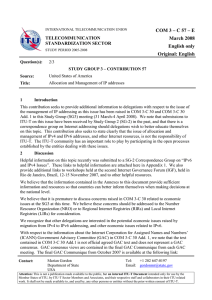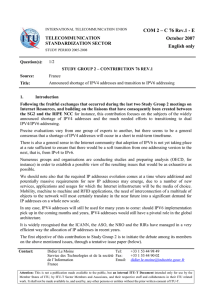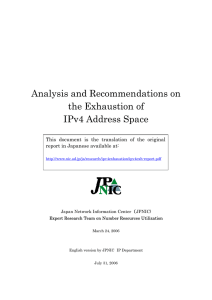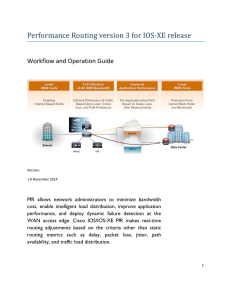COM 3 – C 30 Add.1– E March 2008 English only Original: English
advertisement
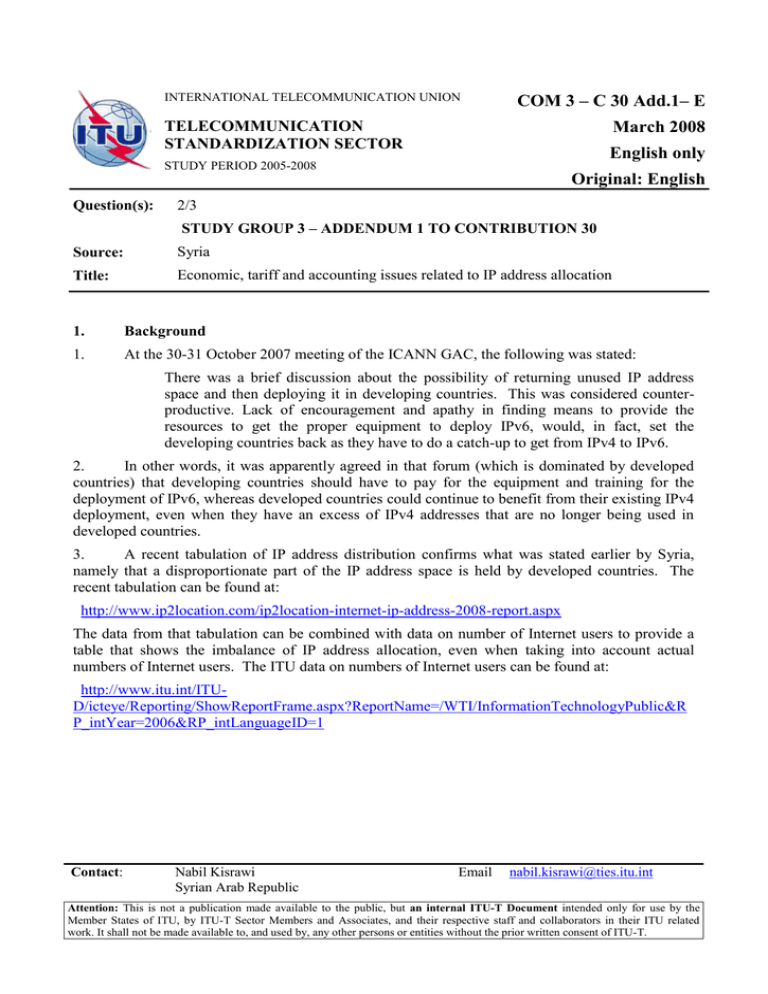
INTERNATIONAL TELECOMMUNICATION UNION COM 3 – C 30 Add.1– E TELECOMMUNICATION STANDARDIZATION SECTOR March 2008 English only STUDY PERIOD 2005-2008 Original: English Question(s): 2/3 STUDY GROUP 3 – ADDENDUM 1 TO CONTRIBUTION 30 Source: Syria Title: Economic, tariff and accounting issues related to IP address allocation 1. Background 1. At the 30-31 October 2007 meeting of the ICANN GAC, the following was stated: There was a brief discussion about the possibility of returning unused IP address space and then deploying it in developing countries. This was considered counterproductive. Lack of encouragement and apathy in finding means to provide the resources to get the proper equipment to deploy IPv6, would, in fact, set the developing countries back as they have to do a catch-up to get from IPv4 to IPv6. 2. In other words, it was apparently agreed in that forum (which is dominated by developed countries) that developing countries should have to pay for the equipment and training for the deployment of IPv6, whereas developed countries could continue to benefit from their existing IPv4 deployment, even when they have an excess of IPv4 addresses that are no longer being used in developed countries. 3. A recent tabulation of IP address distribution confirms what was stated earlier by Syria, namely that a disproportionate part of the IP address space is held by developed countries. The recent tabulation can be found at: http://www.ip2location.com/ip2location-internet-ip-address-2008-report.aspx The data from that tabulation can be combined with data on number of Internet users to provide a table that shows the imbalance of IP address allocation, even when taking into account actual numbers of Internet users. The ITU data on numbers of Internet users can be found at: http://www.itu.int/ITUD/icteye/Reporting/ShowReportFrame.aspx?ReportName=/WTI/InformationTechnologyPublic&R P_intYear=2006&RP_intLanguageID=1 Contact: Nabil Kisrawi Syrian Arab Republic Email nabil.kisrawi@ties.itu.int Attention: This is not a publication made available to the public, but an internal ITU-T Document intended only for use by the Member States of ITU, by ITU-T Sector Members and Associates, and their respective staff and collaborators in their ITU related work. It shall not be made available to, and used by, any other persons or entities without the prior written consent of ITU-T. -2COM 3 – C 30 Add.1 – E 4. The combined data yields the following table: Country Percent of IP addresses Percent of I'net users Ratio %IP addresses to % users UNITED STATES 37.73% 18.42% 2.05 UNITED KINGDOM 12.83% 2.97% 4.32 JAPAN 7.64% 7.75% 0.99 CHINA 5.74% 12.13% 0.47 GERMANY 3.81% 3.42% 1.11 FRANCE 3.65% 2.67% 1.37 CANADA 2.82% 1.95% 1.45 KOREA 2.74% 3.09% 0.89 NETHERLANDS 2.00% 1.29% 1.55 ITALY 1.67% 2.56% 0.65 Rest of the World 19.37% 43.75% 0.44 Total 100.00% 100.00% 5. From this table, it can be seen that seven OECD countries (United States, United Kingdom, Japan, Germany, France, Canada, and Netherlands) hold 70.48% of allocated IP addresses, while accounting for only 38.47% of Internet users. The top ten holders of IP addresses hold 80.63% of addresses, while accounting for only 56.25% of Internet users. In relative terms, China has 4 times fewer IP addresses than the United States and 10 times fewer than the United Kingdom. The same holds for the Rest of the World. Indeed, the Rest of the World holds only 19.37% of allocated IP addresses, while accounting for 43.75% of Internet users. 6. It has been stated that the allocation of IP addresses corresponds to Internet usage, so that the relatively low allocations in developing countries correspond to lower Internet usage in those countries. The data above is not consistent with that position. On the contrary, the data above is consistent with the position that the growth of Internet usage in developing countries is hindered by a shortage of IP addresses, shortage that is due to the continued excessive allocation of IP addresses to developed countries. 8. The Annex to this Addendum contains a presentation made in October 2007 by Mr Randy Bush, a well-known expert on Internet matters. For the purposes of this contribution, slide 5 of Mr Bush’s presentation is very informative. It shows that the slow deployment of IPv6 is resulting in an increasing scarcity of IPv4 addresses and a consequent sharp increase in the cost of IPv4 addresses. That is, in reality, IPv6 is not being deployed, and the cost of deployable IPv4 address is increasing rapidly. ITU-T\COM-T\COM03\C\30ADD1E.DOC -3COM 3 – C 30 Add.1 – E 9. Who gains from the increase in cost of IPv4 addresses? Obviously those that have ample IPv4 addresses, that is developed countries. And who loses? Obviously those that don’t have many IPv4 addresses, that is developing countries. 10. The information provided above would appear to reinforce the concerns raised in 2.3 of the contribution from Syria, COM 3 – C 30. Syria invites further comment on these issues. Further, Syria requests that the Secretariat commission a study on the economic aspects of IP address allocation, with a view to providing data that would address the issues raised in this contribution. ITU-T\COM-T\COM03\C\30ADD1E.DOC -4COM 3 – C 30 Add.1 – E Annex (to Add1 of COM 3 – C 30) Presentation by Randy Bush Bush-v6-op-real ity.pdf ________________ ITU-T\COM-T\COM03\C\30ADD1E.DOC

